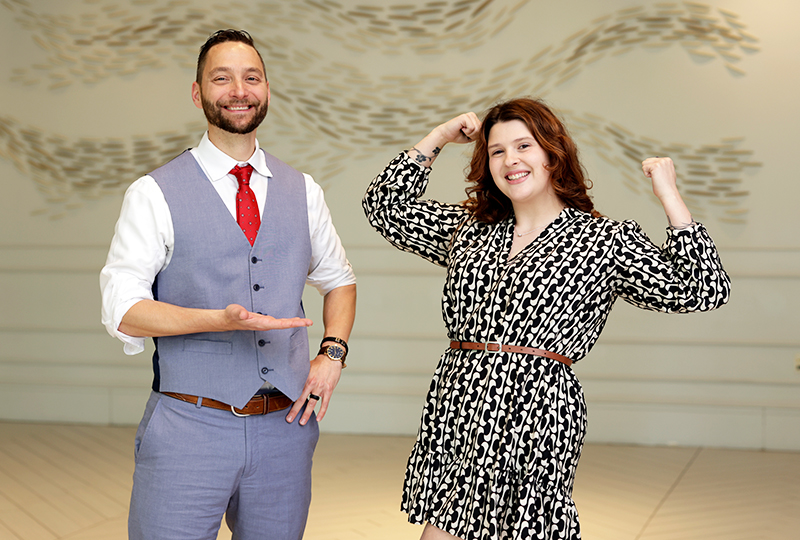Learn about Molly Morgan’s dramatic transformation — and hear from experts why earlier can be better when it comes to the procedure.
In 2020, when Molly Morgan was in her early 20s, she was diagnosed with polycystic ovarian syndrome. PCOS, which is associated with obesity resulting from metabolic dysfunction, can lead to infertility. Morgan was told she likely wouldn’t be able to have children unless something changed for her. Now, she’s lost about 115 pounds and her PCOS symptoms have subsided because she had weight-loss surgery.
“It was the best decision I’ve ever made,” Morgan said, “and I will never regret doing it this young, because I feel like I can actually live the rest of my life now. And I would have lived a miserable life without doing this.”
She’s sharing her story in hopes of encouraging others who are struggling with weight loss.
Morgan’s journey
Morgan tried everything to lose weight. She rattled off the list of her efforts, including CrossFit and going sugar-free, dairy-free, gluten-free and more. There was nothing she wouldn’t try. “I would literally do anything to not feel like this,” she said, “and also to have a chance to be a mom because that’s all I’ve really ever wanted.” But, even with all her efforts, she kept gaining weight. The doctor treating her for PCOS finally referred her for evaluation regarding weight-loss surgery.
Despite thinking she was too young for a procedure that is often performed on older patients, Morgan met with Dr. Christopher Menzel, a bariatric/weight-loss surgeon at the Vanderbilt Weight Loss Center and director of the bariatric surgery program at Vanderbilt Wilson County Hospital.
Menzel said weight loss surgery can be curative to many health conditions but is best used as preventive medicine. Obesity is a leading cause of chronic conditions, like type 2 diabetes and high blood pressure, both of which can lead to heart disease, kidney failure, and even heart attack and stroke. “We can reverse that trajectory and prevent these conditions from developing in the first place by doing these surgeries,” he explained. “This is especially true for those at a young age.”
Benefits of weight-loss surgery at a young age
“All the people I’m seeing who are in their 40s and 50s always say, ‘I wish I had done this 10 or 20 years ago because my life would have been changed immensely for the better.’
Menzel wants to increase weight-loss surgery access, especially for people just like Morgan. “All the people I’m seeing who are in their 40s and 50s always say, ‘I wish I had done this 10 or 20 years ago because my life would have been changed immensely for the better,’” he said.
Additionally, Menzel doesn’t want people to view weight loss surgery as a last resort. “Unfortunately, in people with obesity,” he said, “traditional first steps in health and wellness — diet, exercise and medications — work seldomly in the long term. Weight-loss surgery should be viewed as something that not only works but is also the best approach to achieve short- and long-term weight loss success and maintenance.”
Understanding how surgery affects metabolism
Morgan said Menzel explained to her that obesity is a complex metabolic issue. In her own words, Morgan conveyed what she learned from Menzel. “Your body has adjusted to this new maintenance weight that it likes, and it’s not going to want to go below that,” she said. “If anything, it’s going to keep going above that. He told me, ‘If you could have lost the weight, you would have done it since you’ve been doing all the right things.’ Hearing that was like something switched.” Morgan no longer felt like the weight gain was her fault or that she had failed, and more importantly, she felt like she could do something about it.
Menzel said Molly was doing everything right from a diet and exercise standpoint, but weight loss just wasn’t occurring. That’s because, with obesity, complex hunger and satiety hormone signaling processes can keep the body at a higher weight set point. But a gastric sleeve procedure can result in up to a 90% reduction of hunger hormones, the primary one being ghrelin, as well as other biochemical changes that alter the metabolism for the better, Menzel said. “By undergoing a procedure that’s safe and takes about an hour,” he added, “people really change the trajectory of their lives.”
A bright outlook
“I felt like almost a different person. I could breathe easier, and I could take the stairs easier. I don’t have any of the PCOS symptoms I had before.”
Morgan has noticed dramatic changes in the two years since her surgery. She lost most of the weight in the seven months following the procedure, with some additional weight loss occurring in the subsequent year and half. “Even two months post-op,” Morgan said, “I felt like almost a different person. I could breathe easier, and I could take the stairs easier. I don’t have any of the PCOS symptoms I had before.” She no longer experiences debilitating cramps, nausea or fatigue every month. And she continues to be active, heading to the gym about five days a week.
Morgan reflected on her experience at the Vanderbilt Weight Loss Center. “Every time I have checkups or anything like that,” she said, “it’s like having a support system. They’re as excited for me as I am.”

Vanderbilt Weight Loss Center
If you’ve been unable to reach a healthy weight with nutritional and lifestyle improvements alone, surgery might be a better and safer option for achieving your weight loss goals. The Vanderbilt Weight Loss Center offers advanced care to help you lose weight and improve overall health.

